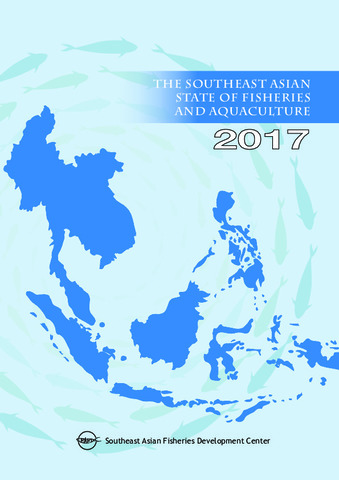The Southeast Asian State of Fisheries and Aquaculture 2017

ရှာဖွေ/ဖွင့်ပါ။
Downloads: 14,065
ရက်စွဲ
2017Page views
1,447
Share
စိတ္တဇ
This publication provides information on the status and trends of fisheries and aquaculture of the region based on statistics and information available in the region. In addition, also included in the publication are selected fisheries related issues/challenges and the outlook of fisheries and aquaculture, in order to raise awareness/preparedness and enhance the capacity of countries in the region in response to the issues.
Contents
- PART I. Status and Trends of Capture Fisheries and Aquaculture in Southeast Asia
- 1. Global Production and Utilization of Fish
- 2. Fishery Production of Southeast Asia
- 3. Marine Capture Fisheries Production of Southeast Asia
- 3.1 Economically Important Marine Species
- 3.1.1 Tunas
- 3.1.2 Small Pelagic Fishes
- 3.1.3 Demersal Fishes
- 3.1.4 Crustaceans and Mollusks
- 3.2 Fishing Vessels
- 3.3 Fishers and Fish Farmers
- 3.1 Economically Important Marine Species
- 4. Inland Capture Fisheries Production of Southeast Asia
- 5. Aquaculture Production of Southeast Asia
- 5.1 Mariculture
- 5.2 Brackishwater Culture
- 5.3 Freshwater Aquaculture
- Fish Processing Industry
- 7. Fish Trade
- 6.1 Global Trading of Fish and Fishery Products
- 6.2 Southeast Asian Export-Import of Fish and Fishery Products
- 7. Summary
- PART II. Issues and Challenges in Sustainable Development of Fisheries of the Southeast Asian Region
- 1. Marine Fishery Resources
- 1.1 Important Pelagic Fishery Resources
- 1.1.1 Tunas
- 1.1.2 Round Scads
- 1.1.3 Mackerels
- 1.1.4 Anchovies
- 1.1.5 Sardines
- 1.2 Important Demersal Fishery Resources
- 1.2.1 Raw Materials for Surimi
- 1.2.2 Live Reef Food Fish
- 1.3 Challenges and Future Direction
- 1.1 Important Pelagic Fishery Resources
- 2. Inland Fishery Resources
- 2.1 Status, Issues and Concerns
- 2.1.1 Inland Fisheries for Food Security and Poverty Alleviation
- 2.1.2 Data Collection on Inland Capture Fisheries
- 2.1.3 Impacts of Water Barrier Construction on Inland Fisheries
- 2.1.4 Complexity of Inland Capture Fisheries and Linkages with Other Sectors
- 2.1.5 Inland Capture Fisheries Compared with Aquaculture
- 2.2 Challenges and Future Direction
- 2.2.1 Improvement of Data Collection and Dissemination
- 2.2.2 Habitat Conservation and Restoration
- 2.2.3 Application of Fish Passage to Mitigate the Impacts of Cross-river Obstacles
- 2.2.4 Mitigating the Impacts of Freshwater Aquaculture
- 2.1 Status, Issues and Concerns
- 3. Marine Species Under International Concern
- 3.1 Sharks and Rays
- 3.2 Eels
- 3.3 Sea Turtles
- 3.4 Sea Cucumbers
- 3.5 Seahorses
- 3.6 Coral Reef Ornamental Species
- 3.7 Challenges and Future Direction
- 4. Utilization of Fishery Resources
- 4.1 Status, Issues and Concerns
- 4.2 Way Forward
- 5. Fisheries Management
- 5.1 Management of Fishing Capacity and Combating IUU Fishing
- 5.1.1 Management of Fishing Capacity
- 5.1.2 Fishing Vessel Registration and Fishing Licensing
- 5.1.3 Traceability of Capture Fisheries
- 5.1.4 Port State Measures
- 5.1.5 MCS Systems and Networking
- 5.1.6 Strengthening Regional Cooperation for Combating IUU Fishing
- 5.2 Management of Inland Capture Fisheries
- 5.3 Responsible Fishing Practices
- 5.3.1 Management and Reduction of By-catch from Trawl Fisheries
- 5.3.2 Optimizing Energy Use in Fisheries and Reducing Carbon Emission
- 5.4 Community-based Fishery Management Approach
- 5.5 Ecosystem Approach to Fisheries Management
- 5.6 Habitats Protection and Coastal Fishery Resources Enhancement
- 5.7 Challenges and Future Direction
- 5.1 Management of Fishing Capacity and Combating IUU Fishing
- 6. Aquaculture Development
- 6.1 Control and Prevention of Present and Emerging Transboundary Aquatic Animal Diseases
- 6.2 Overcoming the Fish Meal Dependence in Aquaculture
- 6.3 Production and Dissemination of Good Quality Seedstock
- 6.4 Producing Safe and Quality Aquaculture Products
- 6.5 Addressing Concerns Due to Intensification of Aquaculture and Climate Change
- 7. Vulnerability of Fisheries to Climate Change and Natural Disasters
- 7.1 Vulnerability of Coastal and Inland Communities and Impacts on Important Habitats
- 7.2 Impacts of Climate Variability and Climate Change on Capture Fisheries
- 7.3 Impacts of Climate Change on Aquaculture Development
- 7.4 Adaptation and Mitigation Strategies to Balance Impacts of Climate Variability and Climate Change
- 7.5 Reducing Carbon Footprints from Fisheries and Aquaculture
- 8. Fisherfolks and Workers in Fishing Activities
- 8.1 Labor in the Southeast Asian Fishing Industry
- 8.2 Safety at Sea, Working Condition, and Safety Onboard Fishing Vessels
- 9. Competition on Use of Water Resources with Other Sectors
- 1. Marine Fishery Resources
- PART III. Outlook of Fisheries and Aquaculture for the Southeast Asian Region
- 1. Growing Demand for Fish and Fishery Products
- 2. Issues and Challenges Towards Sustainable Utilization of Fishery Resources
- PART IV. Appendices
- 1. Policy Recommendations and Strategic Plans for Fishery Resources Enhancement in the Southeast Asian Region
- 2. Summary of Issues and Recommendations on the Use of Alternative Protein Sources as Feed Ingredients in the Diet of Aquaculture Species classified as Herbivores, Carnivores, and Omnivores
- 3. Aquatic Species Farmed in Southeast Asian Countries and Sources of Seedstocks
- 4. Genetic Improvement Programs for the Production of Quality Seeds for Aquaculture
- 5. Technical and Non-technical Issues in the Production of Quality Seedstocks for Aquaculture in the Southeast Asian region Aquaculture
- PART V. References
- List of Contributors to SEASOFIA 20107
